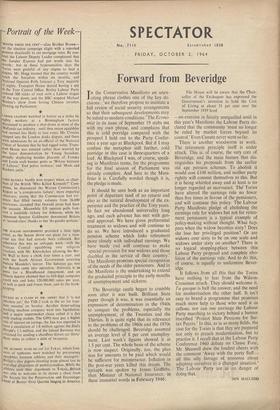Forward from Beveridge
TN the Conservative Manifesto an unex- citing phrase clothes one of the key de- cisions : 'we therefore propose to institute a full review of social security arrangements so that their subsequent developments may be suited to modern conditions.' The Econo- mist in its issue of September 19 stabs me with my own phrase, and complains that this is cold porridge compared with the prospect I held out to the Party Confer- ence a year ago at Blackpool. But if I may confuse the metaphor still further, cold porridge in this case is three-quarters of a loaf. At Blackpool I was, of course, speak- ing in Manifesto terms, for the programme for the final session of Parliament was already complete. And here in the Mani- festo it is. Carefully worded though it is, the pledge is made.
It should be seen both as an important point of departure (and of no return) and also as the natural development of the ex- perience and the practice of the Tory years. In fact we abandoned universality long ago, and each advance has met with gen- eral approval. We have given preferential treatment to widows and will continue to do, so. We have introduced a graduated pension scheme which links retirement more closely with individual earnings. We have made and will continue, to make `special provision for war widows and those disabled in the service of their country.' The Manifesto promises special recognition of the needs of the older pensioners. And in the Manifesto is the undertaking to extend the graduAed principle to the early months of unemployment and sickness.
The Beveridge castle began to crumble soon after it was built. Brilliant State paper though it was, it was essentially an expression of determination in the 1940s to conquer the problems, especially the unemployment, of the Twenties and the Thirties. It is quite right that its relevance to, the problems of the 1960s and the 1970s should be challenged. Beveridge assumed an average level of 8 per cent unemploy- ment. Last week's figures showed it at 1.5 per cept. The whole basis of the scheme is now suspect. Originally, too, the plan was for amounts to be paid which would be sufficient for maintenance. Inflation in the post-war years killed this dream. The epitaph was spoken by James Griffiths, then Minister of National Insurance, in these immortal words in February 1946: The House will be aware that the Chan- cellor of the Exchequer has expressed the Government's intention to hold the Cost of Living at about 31 per cent over the September 1939 level —an exercise in fatuity unequalled until in this year's Manifesto the Labour Party de- clared that the community 'must no longer be ruled by market forces beyond its control.' Even Canute never went so far.
There is another woodworm at work. The retirement principle itself is under attack. This is, of course, the very core of Beveridge, and the main feature that dis- tinguishes his proposals from the earlier old age pehsion schemes. To abolish it would cost 100 million, and neither party rightly will commit themselves to this. But it is being whittled away and at least is no longer regarded as sacrosanct. Th6 Tories have altered the earnings rule no fewer than five times in favour of the pensioners, and will continue this policy. The Labour Party Manifesto pledge of abolishing the earnings rule for widows but not for retire- ment pensioners is a typical example of policy-making without thought. What hap- pens when the widow becomes sixty? Does she lose her privileged position? Or are widows over sixty to be on one scale and widows under sixty on another? There is no logical stopping-place between this Labour Party proposal and complete abo- lition of the earnings rule. And to do this, of course, is equally to undermine Bever- idge.
It follows from all this that the Tories have nothing to fear from the Wilson- Crossman attack. They should welcome it. Tu quoque is half the answer, and the need for modernisation the other half. It isn't easy to brand a programme that promises much more help to those who need it as callous, nor can one envisage the Labour Party marching to victory behind a banner inscribed 'Protect State Pensions for Sur- tax Payers.' In this, as in so many fields, the case for the Tories is that they are prepared not only to preach modernisation, but to practise it. I recall that at the Labour Party Conference 1960 debate on Clause Four, Mr. Shinwell drew the loudest cheers with the comment 'Away with the party fluff—. all this silly farrago of nonsense about adapting ourselves to a changed situation.' The Labour Party are in no danger of doing that.
LAIN MACLEOD














































 Previous page
Previous page